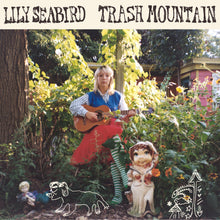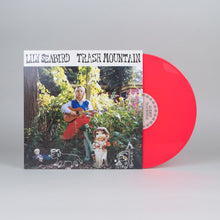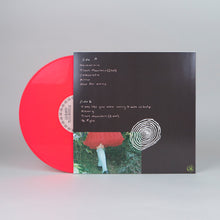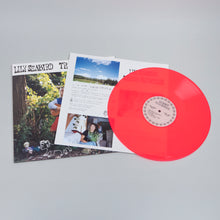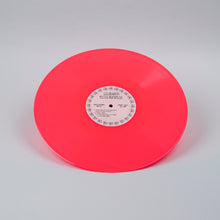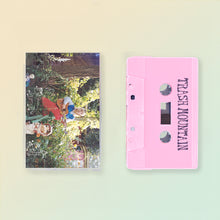
Since 2023, Vermont songwriter Lily Seabird’s life has been in perpetual motion, spending nearly half of that time on the road performing her own music and as a touring bassist with Greg Freeman, Lutalo, and Liz Cooper. While she thrives in transit, back home she is anchored by “Trash Mountain,” a pink house surrounded by other artists and creatives situated on a decommissioned landfill site at the back of Burlington’s Old North End. Here, Seabird has found belonging, friendship, and inspiration. It’s a place that hosts artists, puts on shows, and has been passed along in her friend group for the better part of the decade. It’s a symbol of transition and stability: something always evolving and growing but never losing its soul. It's only fitting that Seabird named her new album Trash Mountain, as it also contains its namesake's qualities. Over nine delicate but sturdy tracks of intimate folk rock, she pares her songwriting down to its most resonant essentials. It’s an album of unwelcome exits and uncertain futures, but there’s resiliency and hope at its core. It is Seabird’s most confident and immediate effort to date.
Where Seabird’s previous records—2024’s Alas, and 2021’s Beside Myself—were written over the course of a year, Trash Mountain practically poured out of Seabird: three months of songwriting in spring 2024, followed by four days of tracking with Kevin Copeland (Hannah Frances, Lightning Bug, Allegra Krieger) in his Southern Vermont studio in the summer. The condensed timeline allowed her to be present and process how differently her life looks now compared to a few years ago. She’s coped with transforming relationships and grief, as well as music’s awkward shift from a no-pressure, casual thing to do with friends to a career. Though working in environmental politics and community organizing brought her to Vermont from Pennsylvania, her disillusionment with systemic change led her to become a full-time musician. It’s a transition that requires deep self-reflection. “Songwriting is meditation for me,“ she says. “It’s the way I work through things and make sense of the world. Being on tour so much I've been writing more just to understand what's happening around me."
Lead single "Trash Mountain (1pm)” came about the day Seabird returned to Burlington after a month on tour, which included 15 shows in a week at SXSW. “Coming home is not always easy for me,” she laughs. “Sometimes I feel like I am a way better version of myself when I'm in the chaos on the road. When I get home, I tend to spiral.” Written on a walk outside her house, she channeled being overwhelmed into a perceptive look at coming down. Over woozy slide guitar and harmonica, Seabird muses, “How are we supposed to remember things / When everything is coming and going?” She doesn’t let herself succumb to her anxieties, finding peace and gratitude for being “on the edge of town / where when I’m home I rest my head.”
While the grief that enveloped her last effort Alas,, which dealt with her best friend’s suicide, still lingers, it’s settled into healing and reflection on Trash Mountain. On “It was like you were coming to wake us back up,” Seabird vividly paints a brief moment of seeing a person outside her house who bears an uncanny resemblance to her dearly deceased. Rather than mourning, she finds comfort and healing in the vision. “In the past, I used to come to songwriting when I was in crisis,” admits Seabird. “Only recently have I come to songwriting when I am feeling other things beyond emergency and disruption."
The album’s arrangements are markedly sparse and intentional, a shift from the layered Alas, and Beside Myself, allowing Seabird’s writing to soar and stand starkly centered. Only three songs feature her longtime touring band in guitarist Freeman, bassist Nina Cates (Robber Robber), and drummer Zack James (Dari Bay, Robber Robber). On the stunning “How far away,” she’s backed only by a piano played by Sam Atallah which makes for elegiac catharsis. “I've finally accepted that I'm a singer-songwriter,” she says with a shrug. “Not everything has to be some big rock song.” Seabird cites Elliott Smith, Neil Young, and Leonard Cohen as influences on Trash Mountain, and much like the latter, her evocative, emotionally potent lyrics find her looking for cracks in the darkness where light comes in, sometimes literally. Take the album’s other title track, “Trash Mountain (1am),” where she sings of a nocturnal stroll: “We walk these streets we’ve come to know / memories live on in them after the snow / is all melted and gone / garbage covers the ground / and you pull a flower from the weeds and you spin me around.” Sometimes all you need is a loved one to show you how to find beauty in the mess.
Trash Mountain boasts a profound grace and openness. On the buoyant “Sweepstake,” she cherishes memories with dear friends and optimistically looks towards the future, singing, “Where are we going is a question I save for halfway / Tonight the kingdom and tomorrow the milky way.” The song captures the carefree feelings of making art with your best friends, nostalgically mining the boundless creativity and possibility of her early music life in Vermont. Life can change in an instant, but Seabird knows that there’s power in grasping onto the purest moments of connection.
Seabird’s best friend would often joke that “the world is trash,” a welcome dose of dark humor as the sentiment rings more true with each passing year. It’s with this resilient spirit that Trash Mountain finds its optimistic, life-affirming center. It’s an album that understands and accepts that highs and lows are inescapable and that the only way through is with small acts of kindness and other people. It’s a tribute to home, chosen families, and taking life as it comes. “I don’t have hope for the oppressive systems that abandon us, but I do have hope in people,” says Seabird. “Sure, the world is really messed up, but that doesn’t mean we can’t make something beautiful out of the garbage. We might as well make something beautiful out of what we have got.”
-
Josh Terry
November 23, 2024
Chicago, IL






